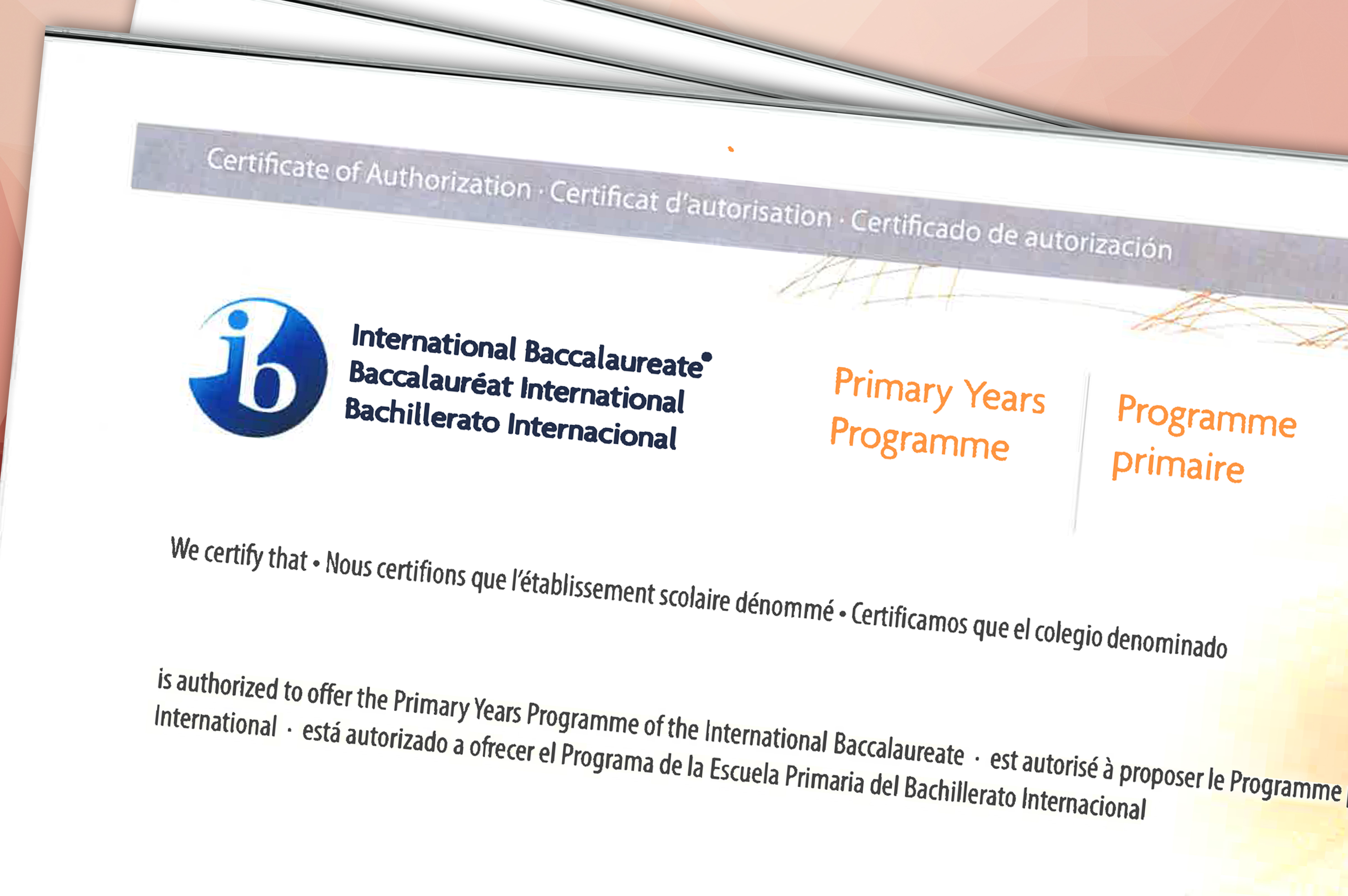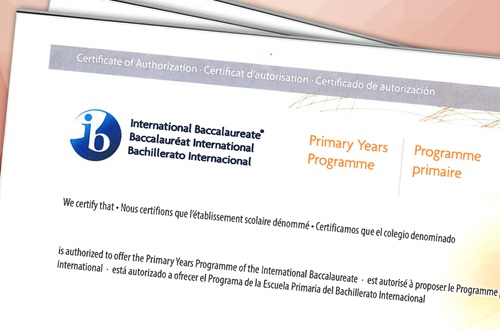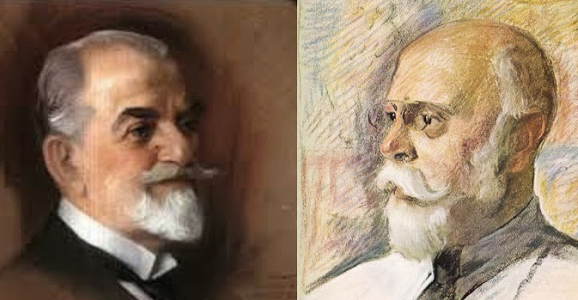
2022
PYP Authorization
The “John M. Carras” Kindergarten and Athens College and Psychico College Elementary Schools are officially authorized as IB World Schools for the Primary Years Programme (PYP).


Athens College owes its founding to the perceptiveness, determination and generosity of enlightened Greeks led by Emmanuel Benakis and Stephanos Delta, as well as prominent American philhellenes.
A chronicle of the School’s establishment and philosophy, as well as the vision of its founders, is captured by Stephanos Delta in three of his articles, published in 1932 in the journal, Ergasia:
“On August 13, 1925, the Founding Committee was granted a charter under the name "Hellenic American Educational Foundation," with an American sister society established in New York, the two societies having as their common goal the founding of Athens College. Conforming to the vision of the founders, the mission of this School would be to educate and shape the character of Greek boys from Greece and from abroad. The founders dreamt of a school that would provide Greek society with patriotic men, humanists of straightforward character, young men endowed with bodily strength and the intellect required to overcome discouraging obstacles. Its students, in acquiring the secondary education provided to them, would thirst for more knowledge from systematic study and from life itself.
A combination of American and Greek educational systems was considered suitable to achieve such a purpose. The results, up to now, seem to justify the opinion of the founders”. *
* Steph. Delta, “Establishment, goal and undertaking of Athens College, I”, Ergasia magazine, vol. 136 (August 7, 1932), p. 997.
The “John M. Carras” Kindergarten and Athens College and Psychico College Elementary Schools are officially authorized as IB World Schools for the Primary Years Programme (PYP).
Athens College and Psychico College are authorized by the International Baccalaureate Organization (IB) as IB World Schools for the Middle Years Programme (MYP), which is implemented in Junior High School and 1st grade of High School.
After a donation by Fotini Livanou and Alexandra Voureka-Petala in memory of their
father, John M. Carras x36, the model, dual language "John M. Carras" Kindergarten is built and begins its operation on the Psychico campus. In its first year of operation, it is certified as a LEED (Leadership in
Energy and Environmental Design) Platinum building by the US Green Building
Council.
Athens College is honored by the Academy of Athens for its 85-year contribution to Greece’s educational and cultural life, as well as its extensive social outreach program.
The "George Economou Informatics Center" is established through a donation by George Economou ΄72, to promote technology in education, utilizing state of the art equipment. As of 2014, the Informatics Center operates on the 2nd floor of the newly built Alexandra Martinou building.
Τhe restructuring-renovation and upgrading of
Benaki Hall is completed in May 2010, with absolute respect for its traditional
architectural features. The project is executed in four phases, starting in
November of 2008, without any disruption to the operation of the School.
The International Baccalaureate Programme is successfully implemented into Athens College, aimed at students who wish to continue their tertiary studies abroad. Since academic year 2000-2001, the IB Programme is administered by Psychico College High School. Today, the Psychico College IB Diploma Programme is the largest in Greece and among the largest in Europe.
On October 11, Latseio Building in Kantza is inaugurated, a donation by the family of Ioannis Latsis “to education and to Greek youth.” The building accommodates Psychico College Elementary School. In his ceremonial speech, Spyros Latsis '65 stressed: “The College today is one of the few centers in our country. I would call it a “Center of Excellence.” Regardless of the educational theories and principles we believe in, Centers of Excellence serve as useful models that radiate spirituality outwards to society. Together with other social forces, they constitute the necessary variety found in successful social groups. Lastly, they help to self-organize and elevate education…”.
The Adult Programs come into being, at first serving the College community and eventually the greater public. They offer a broad selection of courses in the sciences, culture, foreign languages, arts, sports and dance. Each year, new courses are introduced, which are taught by renowned professionals in their respective fields. They are the oldest and largest Adult Education Program offered in Greece.
The new College Theater in Psychico is built through a grant of the US Agency for International Development from the American People. Apart from its primary role in the operation of the School, the Theater serves as an educational and intellectual center and contributes to the cultural life of Athens by hosting a series of events.
Psychico College is established. The new school, initially just a primary school, is housed on the Psychico campus, in buildings with underused capacity due to a shrinking Boarding Unit. Psychico College eventually completes its structure by adding a Junior High School (Gymnasium) and a High School (Lyceum), which are also accommodated on the Psychico campus.
After 52 years of operation as an all-boys school, Athens College
becomes co-educational. Its first female students, 69 in number
and equivalent to 25% of the student population, graduate at Commencement 1988.
On September 19, Bodossakeio Building in Kantza, donated by Bodossakis Athanasiadis to accommodate Athens College Elementary School, opens its doors. In 1978, the American Institute of Architects (AIA Chicago) presents this leading edge building with the Distinguished Building Award.
Thanks to a gift of the US Agency for International Development from the American People, the Central Library and Science Building, later renamed International Baccalaureate Building, are constructed. From the very first years of the College, the Library complements the educational process by providing students with the environment, materials and equipment necessary to develop and practice research skills. On the other hand, the Science Building, which at the time of its construction is equipped with pioneering laboratories and safety tools, gives new impetus to the teaching of science courses across all grade levels.
The Teaching Fellows program, known today as the Fulbright Fellowship Program of Athens College, is established, bringing recent graduates from universities in the United States to the College to act as ambassadors and provide a cross-cultural educational experience. Fellows undertake auxiliary teaching tasks and collaborate with students in the capacity of counselors, coaches, and more. The College today hosts the largest number of Fulbright Fellows of any institution in Greece.
The Athens College Student Community continues its social outreach program in the years that follow. Until 1972, it reconstructs, equips, and maintains more than 20 schools in remote areas of Greece. In 1962, the Academy of Athens awards it for its national and charitable contributions. Today, the School Student Communities continue this tradition through the annual Expedition and other philanthropic and social well-being activities.
The College’s Student Community decides to actively participate in the general effort to rebuild the war-torn country and takes initiatives to cover the construction costs of damaged schools in the Greek provinces, starting with a school in Kampia, Fthiotida. The students raise money, chiefly from a Christmas fundraiser organized by the Student Council and through simple meals, supported by the Administration, faculty, parents and alumni of the College.
At the initiative of alumni, under the auspices of SAKA, the parents, and friends of the College, funds are raised for the construction of the west wing of Benaki Hall, as well as the third floor (attic), which is completed in 1952.
At the beginning of the Greek-italian War (October 28, 1940) all the schools in Greece are closed. Benaki Hall is taken over by the Ministry of War and operates as a military hospital. With the conquest of the city of Athens by German troops, Benaki Hall is used at first as a hospital for British captives, later as a care unit for German soldiers and finally as a German infantry barrack. During this time, the School is housed in a building on Akadimias Street in the center of Athens, provided by Lambros Eftaxias, a member of the HAEF BoD. At the same time, a two-storey house is rented on Parnithos Street in Psychico, where students living in the northern suburbs attend classes.
Athens College’s Coat of Arms, designed by Director of the Boarding Unit, Georgios Phylactopoulos, and teacher, Robert Shaffer, are approved by the Administration and HAEF BoD. The four elements of the Coat of Arms symbolize the origin of the Greeks from the Cretan-Mycenaean era (axe), through classical antiquity (owl) and the Byzantine period (cross), to modern, reborn Greece (phoenix). From another perspective, these elements depict the quadruple mission of the College: the physical, the intellectual and the spiritual development as well as the patriotic education of students.
The College’s landmark building, Benaki Hall, is inaugurated on May 25. The inaugural ceremony is attended by the nation’s Prime Minister, Eleftherios Venizelos, who emphasizes the importance of private education during his address. “…Private schools are where the greatest and most successful innovations may flourish: loosely supervised by the State and complying with broad State guidelines, private school enjoy the freedom which public schools lack and, therefore, may achieve great progress. This is the kind of progress we expect Athens College to achieve. This, in my judgement, is the significance of the College…”.
Homer and Marjorie Davis play a crucial role in the opening and organization of the new school. Homer Davis, originally Head of the English Department and School Librarian, is appointed Deputy Director in 1927. From 1930 to 1932, he takes over as Acting Director, and in 1932 as President. When World War II is declared, the couple departs for America. Upon their return, in 1946, Davis once again resumes his duties as President up until 1960. In 1964, he is appointed Acting President for another two years. For almost five decades, Davis leaves his mark on the formation of the unique character and development of Athens College.
On December 9, a provisional charter is issued by the Regents of the University of the State of New York, giving legal standing to the Board with the title: “Trustees of Athens College in Greece.” The title is later changed to “Board of Trustees.” Its founding members are: Edward Capps, Charles Howland, Ery Kehayia, John H. Finley, James T. Shotwell, Kenneth C. M. Sills, William G. Mather, Stephen P. Duggan. Albert Staub is appointed Executive Secretary.
The Scholarship Fund is created. Its founders and first donors are Stephanos Delta and his wife Penelope, daughter of Emmanuel Benakis. Thanks to the Scholarship Program, hundreds of students whose families face financial hardships receive assistance and are able to attend the School. As mentioned by Stephanos Delta in 1932: "It was not fair to exclude diligent boys of good conduct who could develop into useful citizens, only because they belonged to poor families. It is not our wish that the education given by the College becomes eventually a privilege of the wealthy". According to Homer Davis, the Scholarship Program has become virtually synonymous with the spirit and ideals of the College.
The Boarding School is launched at the same time as the School. The first student to enroll is temporarily housed in a neighboring hotel called White House. When the school relocates to Psychico in 1928, comes the operation of the Boarding Unit in the east wing of Benaki Hall and Ralph E. Kent is appointed as its Director. In 1932, Georgios Phylactopoulos succeeds Kent. During the outbreak of the Greek-Italian War in 1940, both the Boarding Unit and the School cease to operate. It is not until 1946 that the Boarding School reopens its doors to 132 boarders. During the 1950s and early 1960s, the Boarding School experiences tremendous growth, surpassing a total of 230 boarders. By then, it is accommodated in the premises of Tsolainos House, Glafka House, Capps Hall, Vasileia House, Davis House, and Lila House, which have been gradually constructed on the Psychico campus. In 1970, Solon Zacharof undertakes the directorship of the Boarding Unit until 1983 when its operation is permanently ceased.
On October 18, the inauguration of the newly founded School known as Athens College takes place. Classes start the next day at a rented building on Androu Street, in the center of Athens. There is an initial enrollment of 15 students but the number doubles by the end of the first month. Among the students, eleven are refugees from Constantinople and Asia Minor, five are from abroad, nine from the greek provinces and five come from Athens.
On August 13, the Association known as "Hellenic-American Educational Foundation" is established and its statute is approved for the founding of an all-boys school. The first HAEF Board is comprised of: Epaminondas Charilaos (Chairman), Bert Hodge Hill (Vice-Chairman), Stephanos Delta (Treasurer), Stavros Papadakis (General Secretary), Emmanuel Benakis, Petros Kalligas, Harold Jaquith, Nikolaos Kyriakides (members). Later on, Emmanuel Benakis is proclaimed Honorable Member of the BoD and his position on the Board is assumed by his son Antonios Benakis.
Additional information about the history of the College can be found in the following books:
Extensive reference to the cultural-artistic traditions and contributions of the College can be found in the book: Καραμάνος, Δ. (2001) «Αγωγή Ψυχής - Τέρψη Ζωής: Η πολιτιστική -καλλιτεχνική παράδοση και προσφορά του Κολλεγίου Αθηνών από την εποχή του Καρόλου Κουν και του Μίνου Δούνια μέχρι σήμερα» Αθήνα: Ελληνοαμερικανικόν Εκπαιδευτικόν Ίδρυμα.


















































